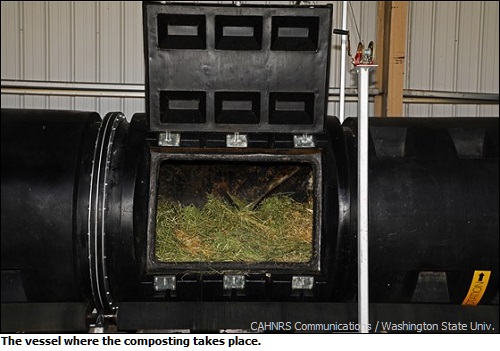
|
|

|
|
| April 26, 2024 |
|
Washington might be first state to legalize human composting 
PULLMAN, WA--Governor Jay Inslee, a 2020 Democratic presidential candidate whose campaign focus is climate change, could make U.S. history by signing a bill to legalize “human composting” in the state of Washington.
Touted as an eco-friendly alternative to cremation and traditional burial, the proponents of the bill, which would take effect next May, hope the technique will give people a more eco-friendly alternative to burial or cremation, and revolutionize the funeral industry. But what is human composting, and how does it work? The concept owes much of its buzz to Katrina Spade, an entrepreneur and architect who set up the human composting nonprofit Urban Death Project and public-benefit corporation Recompose. Spade wanted to mimic the natural decomposition that occurs after a body is buried, but without the heavy land use of traditional cemeteries. Inspired by existing agricultural technology, Recompose aims to “gently” reduce human bodies to soil with the help of wood chips, alfalfa and straw, The Associated Press reported. The company would place human remains inside large, cylindrical tubes lined with this organic matter, NBC reported in December. A controlled supply of oxygen would help speed up decomposition and, within a few weeks, a body would yield roughly a cubic yard of compost. Last year, Washington State University researchers tested out the idea on seven donor bodies in a small pilot project. An earlier design, described by Wired in 2016, saw bodies pass through a larger silo-style structure, descending toward the ground as they decomposed. This multi-story “recomposition center” was designed to house several bodies separated by wood chips. Discussing the “recomposition” process with specialist website Mind Body Green last November, Spade said: “We're really letting nature do its own job… We create the environment that allows naturally occurring microbes to break a body down using high-carbon materials like wood chips, carbon and moisture.” This week, she told the AP: “Our goal is to provide something that is as aligned with the natural cycle as possible, but still realistic in being able to serve a good number of families and not take up as much land as burial will.” Spade, who honed her ideas with Washington State University researcher Lynne Carpenter-Boggs, has support from other eco-friendly burial groups. Lee Webster of the Green Burial Council told Newsweek her concept was a “win-win” for the planet and for people. “With cemeteries filling up even in rural areas, we have to develop an alternative that truly addresses space issues, accessibility, environmental repercussions and the emotional needs of families,” he said. The GBC promotes burial in biodegradable caskets and shrouds “without impediment” at 3.5 to 4 feet, Webster explained. Its against the use of embalming chemicals, the concrete and metal vaults that often support the ground beneath cemeteries, and the heavy carbon footprint of cremation. “Where green burial is not feasible, recomposition makes perfect sense. It mimics the decomposition process that green burial offers, plus it creates a finished product that is beneficial and tangible,” Webster said. “We often become focused on the environmental conundrum that conventional burial has created, and we forget that this is, above all, a self-inflicted wound on us as humans,” he added. “We've lost the fundamental human habit of seeking meaning in death.” (Source: Newsweek) Story Date: April 24, 2019
|